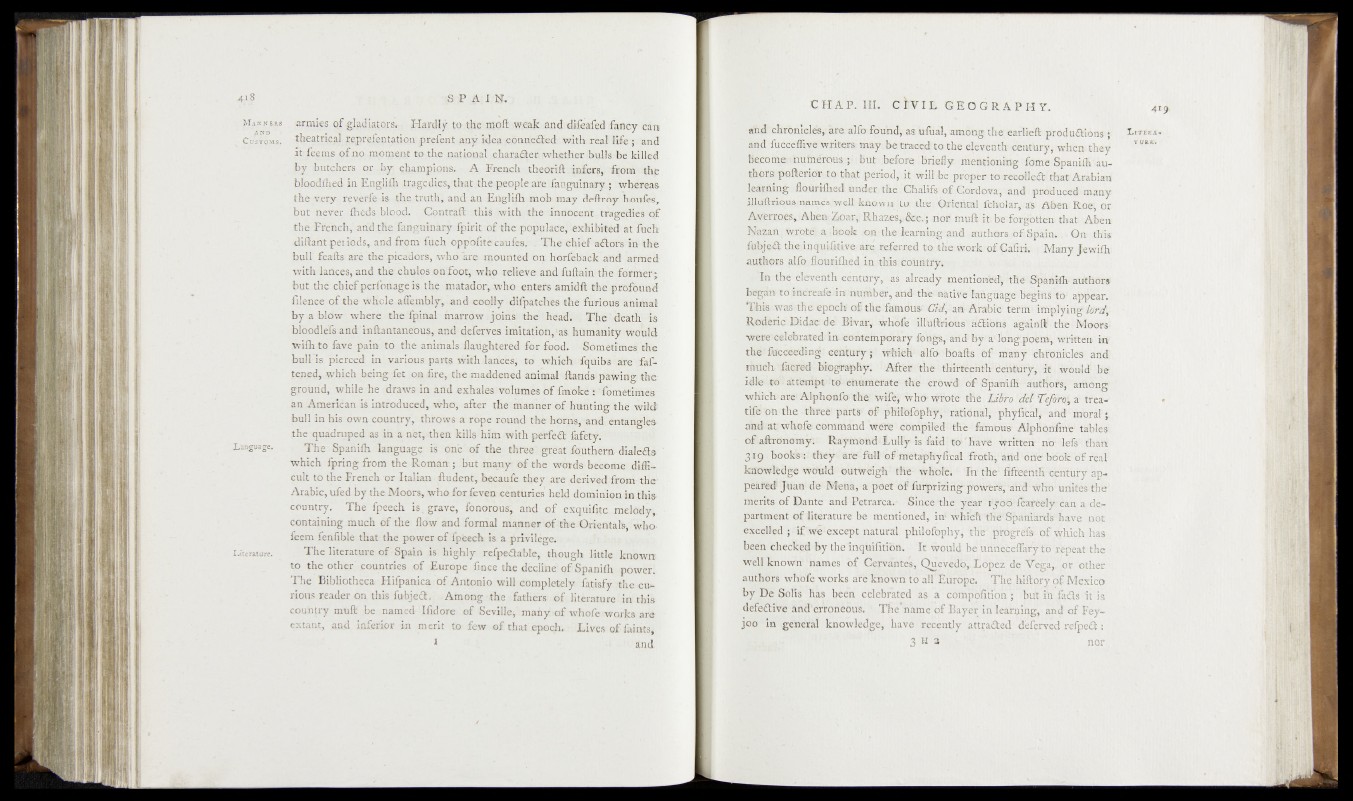
S P A I N.
** armiez g f gladiators. H a rd ly to the moft weak and difeafed fancy can
S. theatrical reprefen.tation prefent an y idea .connected . with real life ; and
it feems o f no' moment to the national character whether bulls be killed
Jby butchers or by champions. A French theorift infers, from the
bloodfhed in Englifli tragedies, th a t the people.are fanguinary ; whereas-
th e v e ry reverfe is the tru th , and an Englifli mob may deftroy houfcs,
' b u t never {beds blood. Contrail; this w ith the innocent tragedies o f
the French, and the fangüinàry fpirit o f the populace, exhibited at fuch
diftant peiiods, and from fuch oppolite caufes. | T h e chief aftors in th e
bull fea-fts are th e picadors, w h o are mounted on hoifeback and armed'
w ith lances, and the chulos on foot, who relieve and fuftain the former -
but the chief perfonage is the matador,- w ho ■ enters amidft th e p rofound
filence o f th e whole affembly, and coolly difpatches the furious animal
by a blow where the fpinal inarrow; Joins:th e é b e a f l :ThelidèÿiÉ1 is
bloodlefs and ‘ mftaataneoiis, and- deferyes
wilhto favë paia to the anitnals fknghtered for food: '-Stometimes the
bull-is pierced in various parts with lances, to which fquibs are faf-
tened, which being fet on fire, the maddened animal Hands pawing the
ground, while he draws, in and exhales volumes o f frnoke : fometimes
an American is introduced, who, after the manner o f h u n tin g the w ild
bull in his own co u n try , throws a rope round the horns, and entangles
th e quadruped as in a. net, then kills him with perfect fafety.
T h e ' Spanifh language is one o f the three great fouthern- dialedls
which fpring from the. Roman- ; but many o f the words become difficult
to the French-or Italian ftudent, becaufe th ey are derived from the*
Arabic, ufed by the. Moors, who for feven centuries held dominion in th is
country. Thé fpeech is v grave, fonorous, and o f exquifite melody,,
containing much o f the flow and formal manne r o f the, Orientals, who-
feem fenfible th a t the power o f fpeech is a privileged i
The literature o f Spain is h ig h ly refpeöable, th ough little known;
to the othe r' countries o f Europe fince the décliné o f Spanifh power.
The Bibliotheca Hifpanica o f Antonio will completely fatisfy the curious
reader on this fubjeft. Among the fathers o f literature .in this;
country muft be named Ilidore o f Sevillej: m an y -o f whofe -works are-
extant, and inferior in merit to- few .of that epoch. Lives' o f faints,
1 4 And.
CHAP. Ilf. QITVIR G E O G R A PH Y .
and chronicles, are. alfo found, as. ufiial, among the earlieft productions ;
and fucceflive writers; may be tra c ed'to the eleventh century, when they
b e c om e . numelous p But before briefly mentioning fome Spaniflr authors:
pofterior- to th a t period, it will be proper to recollect chat Arabian
learning flouriflred under the Chalifs o f Cordova, and produced many
ilhiflrious-names well known to the Oriental foh-olar, as Aben Roe, or
Averroes, Aben Zoar, Rhazes,,-&c.; n o r muft it be forgotten that Aben
Nazan wrote , a :Book on the learning and authors o f S p a in ., | On th is
fubject the inquifitive a re re fe rre d to th e work o f Gafiri. * M an y Jewifh
authors alfo ftourifhed in th is country. es
In th e eleventh century, as already mentioned,- th e Spanifh- authors
began to inc'rcafe in number, and' the native language begins to appear.
'This was th e epoch o f the famous* Cid, a a A rab ic term implying’
Rodgnc Didac: de Bivar, whofe illu-ftrio'us’ actions agairiftl the 8 Moors*
■weffe''edebrated; in contemporary inf
th eT ftjp ^ d in g ? whiefl-' dlftf dSo&fts b f many rfWebfcles.- arid?
rbaeL->l&efdd biogifepfiy. After, th e it # e u 0 '.&g
wKicRacef AlphOfiIb>-lfoe! wifey wh&Wr'ote tflteM $-o 'ik t T efirfy, ar tfea--
a n d mbr^Pj
and at; whofei command were compiled'"the femotts' Alphbn#nei tables'
oflaflyonoray: Raymond*i&ufly is Md fe'Kavi* Written-; nbV;lefs‘ thah"
3k9.bo6Ww' they
knowledge would outweigh the- whole. ■ I n th e fifteenth century appeared
Ju an de Mena, a poet o f furprizing powers, and-Who unitesThe
merits o f Dante and Petrarca.- Since the year iJydb-‘ fe a te ely c an a department
o f literature be mentioned, in -w h ich th e 'S p an ia rd s have not
excelled ; i f we -except natural philofbphy, th e progrefs- o f w hich has
been checked by the inquifition. I t would be unnecelFary to repeat * the
Well k n ow n names o f Cervantes, Quev,edb,.Eopez de V eg a , or other
authors whofe works are known to all Europe. T h e hjftory o f M exico
by De Solis has been celebrated as a compbfltion ; but in fa d -s it is
defective an d 1 erroneous. 1 T h e ’name o f B ayer in learning, and o f Fey-
joo in general knowledge, have recently attracted deferved r e fp e d :
1 H 1
LrresA«
TURE.
nor